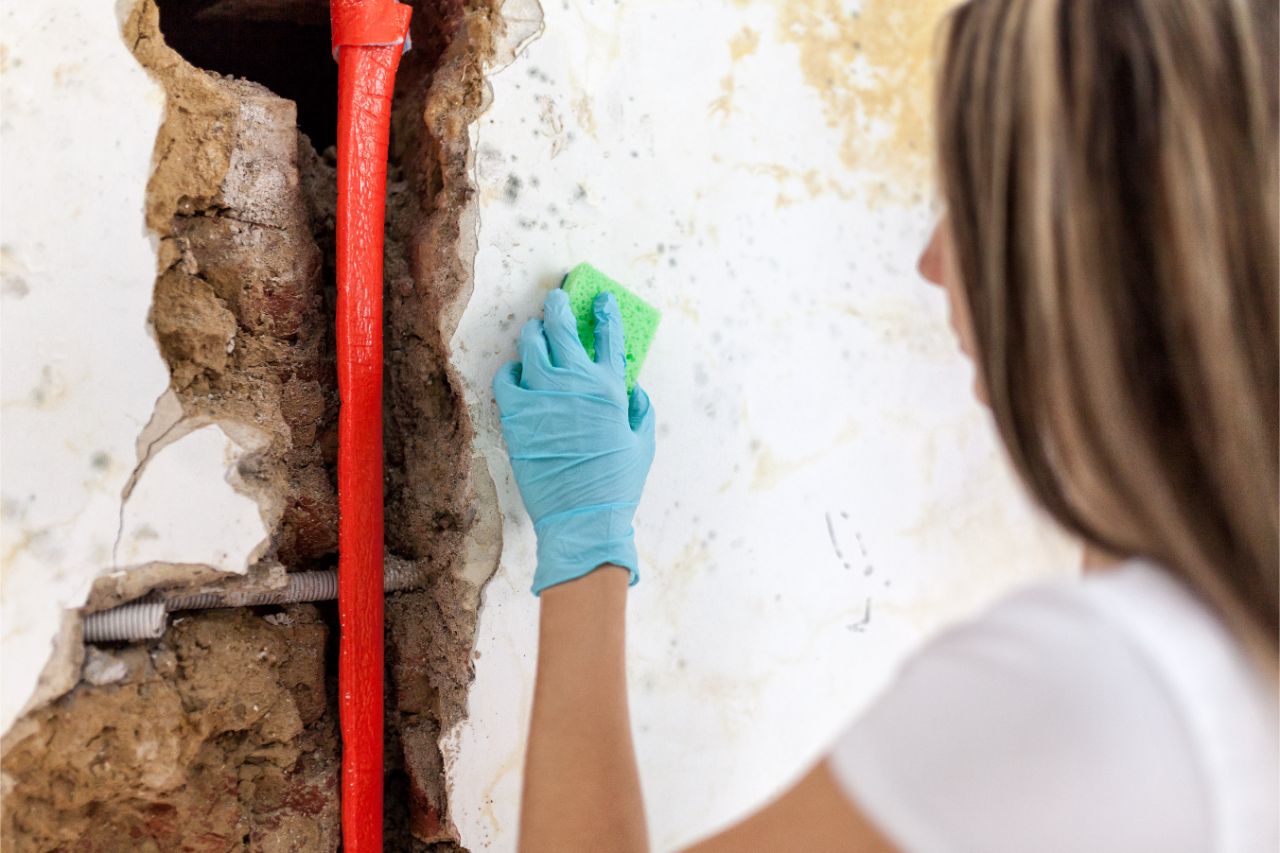
How to Prevent Mold in Pipes
How to prevent mold in pipes:
- Know the warning signs
- Clean on a regular basis
- Improve the airflow
- Invest in a dehumidifier
- Remove pipe obstructions
- Fully insulate cold-water or cold-air pipes
- Design with drainage in mind
- Have regular inspections
Mold loves damp, dark, and enclosed spaces — they’re the ideal growing conditions for this type of fungus. So, one of the most common places to find it is in and around your pipes. This pipe problem can easily become a serious issue, as you can’t easily inspect the insides of your pipes when you suspect you have a mold problem.
Fortunately, there are a few precautions you can take to stop the growth of mold, and prevent it from happening again in the future. In this post, we cover how to prevent mold in pipes and protect your home from this problem. And, if you’ve suddenly noticed a moldy smell inside your home — keep reading! These tips may come in handy in saving the rest of your pipes.
Why is it important to keep my pipes mold-free?
Mold can be dangerous to your health — if you inhale, ingest, or otherwise come into contact with mold, it could lead to the following symptoms:
- Wheezing or coughing
- Eye or skin irritation
- Congestion
- Sore throat
- Problems with sleeping
- Problems with concentration
- Dizziness or headaches
Mold exposure is an especially big risk for those who have allergies, compromised immune systems, and lung conditions.
Which areas are more likely to have a mold problem?
Now that you know the dangers of mold, you may be wondering which areas to check first. High-risk areas include anywhere dark and damp — such as your basement, or certain parts of your bathroom. Also, keep an eye on places that have recently been exposed to flood or rain damage.
Now that you know where to check for mold, here are a few preventative measures you can take for your pipes.
Know the warning signs
As we mentioned, mold exposure can lead to some serious health issues. If you’re suddenly developing a heavy cough or other symptoms, then it may be a good sign of a mold problem.
Other signs, like a mildew smell or warped floors in certain areas, should have you on the lookout for mold around the water sources in your home. Early detection is always key in preventing a more serious mold problem for your pipes.
Clean on a regular basis
One of the most important parts of preventing the spread of mold in your home is to clean your pipes regularly. Simple and cost-effective DIY cleaning hacks, like pouring boiling water, baking soda, and vinegar down your pipes are a great way to clean your pipes in a pinch. In tropical or humid environments, cleaning should be done more often (think once or twice a month). Regular cleaning will prevent mold spores from latching onto your pipes and drawing moisture from them.
Improve the airflow
Mold needs lots of humidity to thrive — so keep your humidity levels in check. One of the easiest ways to prevent rooms from becoming a breeding ground for mold is to open up doors and windows and let in some fresh air. This circulation prevents rooms like your bathroom or laundry room from becoming too stale and humid, which in turn protects your pipes.
If you can’t open your windows, consider adding a fan or exhaust vent to your rooms instead. These appliances will help improve air circulation and help dry up any damp spots in the room.
Invest in a dehumidifier
Dehumidifiers are another great appliance to help keep your humidity levels low indoors. You could invest in a good quality dehumidifying appliance, or pick up a few packs of disposable ones too — either option works just fine. Place these in your bathroom, basement, and other damp areas around your home. You should aim to keep the relative humidity in these rooms below 60%. But, the ideal range (if possible) is 30 to 50%.
Remove pipe obstructions
Pipes, particularly in the kitchen and bathroom, are often obstructed by cleaning supplies or other appliances. In some cases, such as your sink, this is inevitable. But, as much as possible, you should avoid covering up your pipes.
The first reason is that it would make inspection more difficult, and mold could easily hide below or behind these obstructions. The second is that certain things, like cleaning supplies, lotions, and other liquid containers, can sometimes leak. These leaks pool around the pipes, which can also cause a mold build-up.
To prevent this, avoid placing liquid containers near your pipes, and always check their lids and containers for any possible leaks. Further, make sure to inspect around and under any obstructions carefully, to seek any hidden leaks or signs of mold.
Fully insulate cold-water or cold-air pipes
Make sure all of your pipes and their fittings that carry cold air or water around your home are fully insulated. These pipes tend to build up condensation because they carry around cold material, which can become a problem. Whenever possible, ask if your pipe supplier or subcontractor can use insulation materials with non-moisture-absorbing properties. This will help keep condensation in check and prevent mold from growing on and around your water or air pipes.
Design with drainage in mind
If you’re constructing or renovating your home, then design your piping systems with drainage in mind. This requires pipes and other system equipment to be installed at the appropriate pitch for proper drainage. You will also need to provide plenty of drains and drain pans, which help water flow away from certain areas of your home. This prevents stagnant water pools, which are potential breeding grounds for mold.
Have regular inspections
Lastly, have your pipes inspected by a professional at least once every year. This will help you catch any leaks, loose pipes, and other issues with your systems early on. The earlier that you find a pipe issue, the quicker you can fix or replace the affected pipe — therefore, the less mold you’ll have.
Key Takeaway
Mold might be a common problem for many households, but that doesn’t mean it has to be a problem for yours. When you know how to prevent mold in pipes, you can minimize the risk of mold, and maintain your pipe systems well.
Have you found extensive mold and water damage in your pipe system? Get in touch with Supreme Pipe today. We can supply you with the right replacements for all your pipe needs — we are the premier choice for any industrial, commercial, and residential application!


